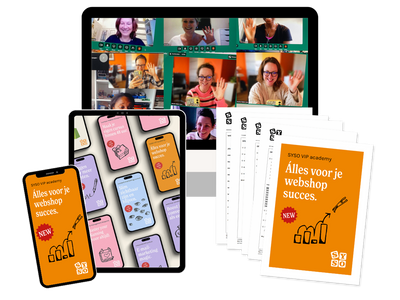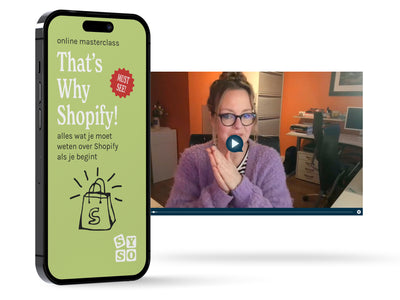As an independent entrepreneur you have a lot of responsibilities, to do lists for days and sometimes no idea where to start. The chances are that you have a condition that many entrepreneurs suffer from: Shiny object syndrome. If you suffer from this, it is very wise to banish this virus before it completely affects your company.
Also listen to the podcast
Shiny object syndrome in action
Shiny object syndrome (SOS) is also called 'disease of distraction'. In not-so-nice-Dutch: the disease of distraction. Unfortunately, it affects you as an entrepreneur precisely because of the qualities that make you unique. Entrepreneurs are often super motivated, like to try out the latest marketing gadgets and developments. Moreover, they are not afraid to start new projects and make new things.
Great features, but...
Normally these are great features, but when SOS creeps in, it forces you to pick up every new idea, marketing option/trick and figure it out. Because there is so much possible and offered, the trials pile up, nothing gets finished and ultimately nothing really works optimally.
Shiny things
Shiny object syndrome is so called because it can be compared to a small child who sees a different shiny object every time. Once she sees the shiny object up close, she immediately loses interest and goes looking for the next shiny thing. For entrepreneurs, instead of literal shiny objects, these can be business goals, marketing strategies, webinars, challenges, courses, customers, projects or even other businesses.
When you really need to start paying attention
Keeping yourself and your company informed about new possibilities is not a bad goal in itself. The real problems only start when SOS goes uncontrolled and you recognize the following:
-
You fail to actually finish projects . It’s easy to get excited about a new project before you’ve finished the previous one. Worse still, you dive in before the previous project has shown that it might have been valuable. Suppose you’ve been working on an SEO strategy for a month or two and then switch to another strategy entirely, you’ll never see the long-term benefits of properly maintaining that SEO strategy. What a waste of those two months of investment...
- Ideas and directions are not planned . People with SOS tend to focus on the novelty of following a particular strategy, or making a specific change, rather than the strategy or change itself. For example, they may love the idea of creating a new product and start working on it, but without long-term planning for how to execute the idea. This leads to lousy execution and dead-end projects (that could have been potentially successful).
- Wasting money . There are hundreds of apps, challenges, courses and programs for businesses that are impressive, effective and even just plain fun to try. Unfortunately, if you try everything, track everything and try to keep up, jumping from platform to platform, you’ll waste so much money (and time!) that these tools become super cost-inefficient.
How do you counter SOS?
In other words, what can you do to ban SOS?
-
Think about your ideas before you act on them . Sleep on them before you start working on that new project that will ‘change everything’. Do some research on the idea and consider whether it really is the next best thing for you and your business. Not every idea needs to be executed, and giving yourself this time can save you from making a hasty decision.
-
Communicate with the people you work with . If you have a new idea, talk about it with your network/wolfpack (but talk to people who know about it!). Ask them what they think and listen to their perspective. Putting things into perspective can sometimes be very helpful in making the right choice.
-
Write it down . Write all your potential plans in a notebook. Then you will lose it temporarily, but not forever. Who knows when it will come in handy. Not everything has to be done and not everything has to be done NOW.
-
Set both long-term and short-term goals for each new project . Don't just dive into something completely new without writing down a clear objective. We call this a 'Master Plan'. Every time we develop a new course, project, program or tool, such a plan follows first. Not complicated and extensive, but to the point. Things like goal, target group, mission, cost indication and launch are described in it.
-
Only stop running projects if necessary . Don't stop until you've achieved your long-term goals. You entered with a deliberate mind, now you have to finish it! The only exception is if your project is going to cost a lot more money than expected, or if the market has suddenly changed drastically to keep your project successful.
- Make an Annual Plan . Make that annual plan and follow it, this prevents adhoc behavior and that is better than cure. How do you make such a plan? That and many more useful planning ideas can be found in our Master your planning program .
Fortunately, SOS is not a real medical condition. It is a problem for the development of your company. Now that you have read this article, it is the intention that you pay attention to your behavior and know when SOS rears its head that you can intervene and correct it immediately.
Being alert to SOS will ultimately lead to a more balanced and effective path for you and your business. Trust me!
The Cure for Shiny Object Syndrome
If you choose content marketing , you will work with focus on a strategy, a mix that works for you. This often solves Shiny object syndrome to a large extent.
source: Entrepreneur









